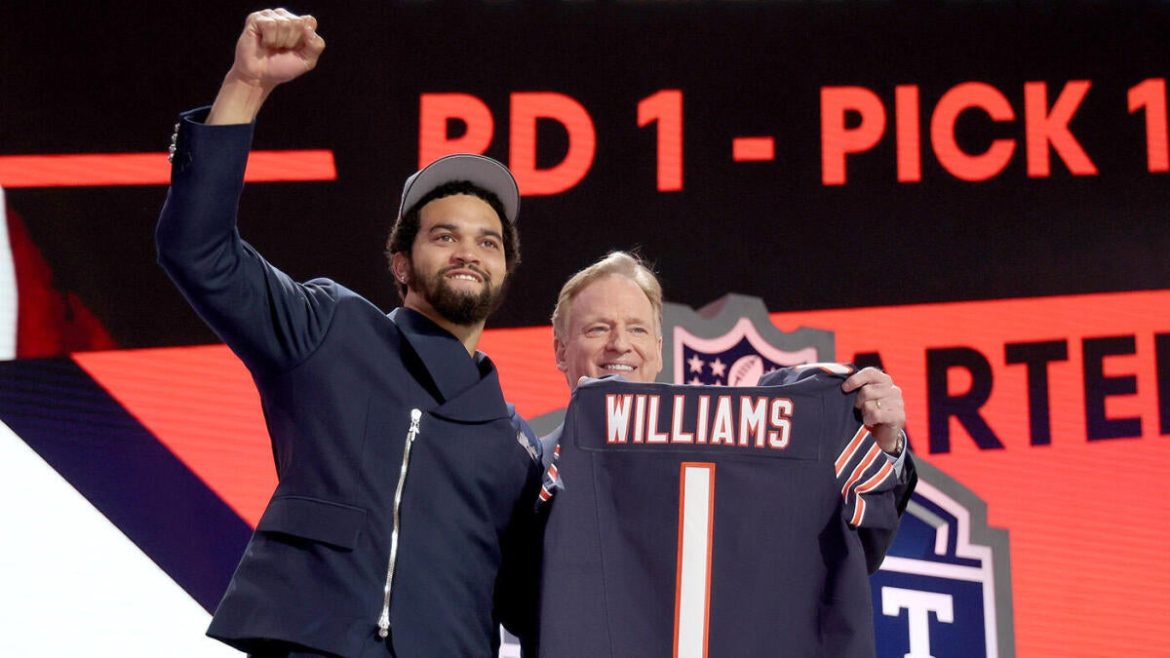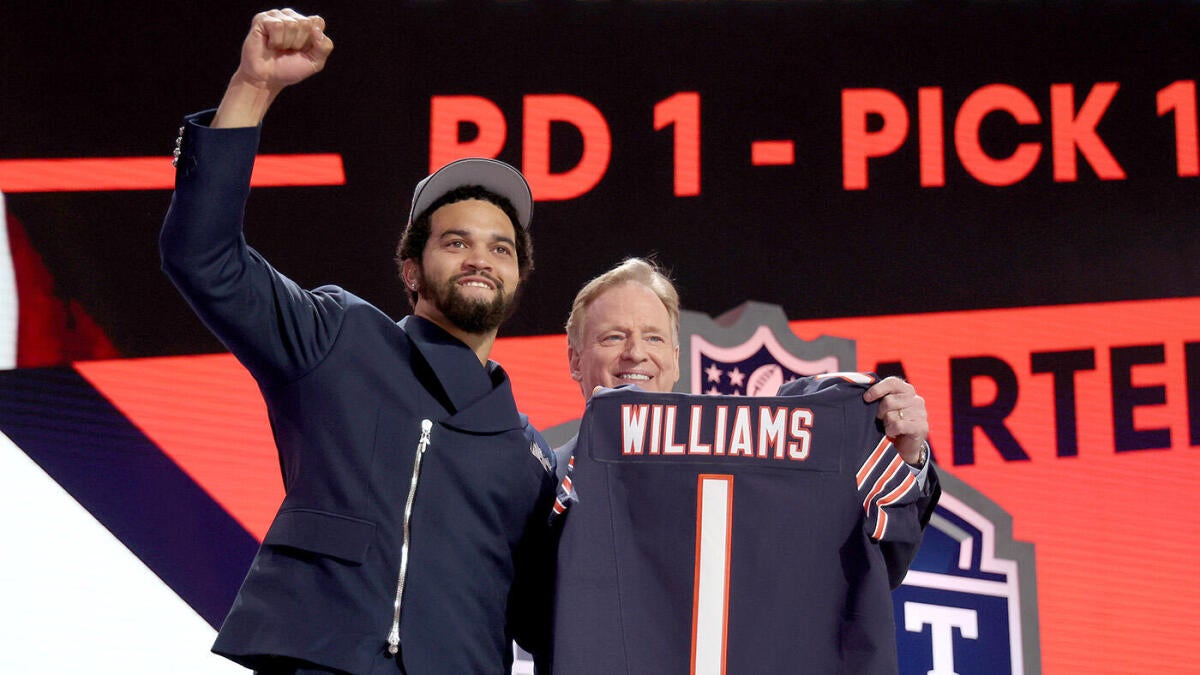Caleb Williams and the Chicago Bears: A Complex Journey from Draft Controversy to Rookie Season
The story of Caleb Williams’ entry into the NFL, particularly his relationship with the Chicago Bears, reads like a drama that extends well beyond the typical rookie quarterback narrative. Williams, a highly touted Heisman Trophy-winning quarterback from USC, was the first overall pick in the 2024 NFL draft, selected by the Bears. However, behind this straightforward fact lies a tangled tale of draft-day resistance, strategic maneuvering, and evolving personal acceptance.
The Draft Dilemma: Williams’ Desire to Avoid the Bears
The lead-up to the 2024 NFL Draft was clouded with speculation and insider revelations that Caleb Williams did not want to be drafted by the Chicago Bears. Multiple reports, including those from ESPN’s Seth Wickersham in his book *American Kings: A Biography of the Quarterback*, reveal that Williams, and particularly his father Carl Williams, sought ways to circumvent the draft process, aiming to influence where Caleb would begin his professional career. The senior Williams was concerned about the Bears’ franchise state and his son potentially landing in a challenging environment.
This resistance was punctuated by Williams’ reportedly preferred destination: the Minnesota Vikings. After meeting with Vikings head coach Kevin O’Connell during the NFL Scouting Combine, Caleb expressed a clear desire to “go to the Vikings.” The reports suggest he was so intent on avoiding Chicago that he explored unconventional ideas, including playing a season in an alternative league (such as the United Football League) to delay or reroute his NFL entry.
The Bears’ Unyielding Position and Williams’ Acceptance
Despite Caleb’s efforts to steer his entry away from the Bears, Chicago’s general manager Ryan Poles was unequivocal that Williams would be drafted by the Bears “no matter what.” This firm stance effectively closed the door on any trade or draft avoidance tactics.
The psychological journey Williams underwent was marked by typical stages of resistance: anger, denial, bargaining, and even depression, before arriving at acceptance. These human emotions underscore the complexity of being drafted to a team against one’s initial wishes, especially at such a high-profile position. Still, by the time rookie season commenced, Williams appeared to embrace his role, emphasizing positivity and team cohesion despite the rough start.
Rookie Season Performance: Challenges and Growth
Caleb Williams’ rookie season with the Bears was far from smooth. Statistically, he faced significant adversity, including throwing 20 touchdowns alongside six interceptions and enduring a league-high 68 sacks, reflecting a combination of inexperience, offensive line struggles, and the pressure associated with being the focal point of a struggling team.
The Bears themselves had a difficult season, enduring a 10-game losing streak and finishing with a 5-12 record. These challenges spotlight the inherent difficulties of integrating a rookie quarterback into a team seeking to rebuild or reestablish competitive footing. Offensive adjustments included firing offensive coordinator Shane Waldron mid-season and promoting Thomas Brown in an attempt to stabilize performance.
Despite these setbacks, Williams showed flashes of potential and leadership. His connection with emerging talents like Rome Odunze and the support from teammates such as tight end Cole Kmet painted a picture of incremental development. Williams’ public optimism, highlighted by his daily affirmation that the Bears would be “pretty good,” speaks to his resilience and professional attitude.
Public and Media Reception: From Criticism to Support
The early narrative around Williams was heavily influenced by the revelation of his draft resistance, coloring public and media perception of his commitment to the Bears. Some Bears fans and commentators expressed frustration or disappointment, interpreting these incidents as a lack of buy-in or loyalty.
However, many analysts, including those at ESPN and The Athletic, projected a more optimistic outlook, recognizing that Williams was set up for future success provided he received proper support and patience. The switch in offensive leadership and incremental roster building around him fostered hope for a turnaround.
The nuanced reality is that Williams is still navigating the transition from college superstar with national acclaim to NFL rookie quarterback within a franchise needing stability. His initial misgivings about being drafted by Chicago do not negate his evident dedication to improving and leading the team forward.
The Larger NFL Context: Draft Realities and Player Agency
Williams’ experience sheds light on the unique nature of the NFL Draft system, where players have limited control over their initial destinations despite being elite prospects. It underscores the tension between player aspirations and franchise prerogatives, raising questions about agency, loyalty, and the psychological toll of professional sports transitions.
The efforts by Williams’ family to find ways around the draft process were unusual but not unprecedented. It reflects a growing awareness among athletes and their support networks of the power dynamics at play and the desire for long-term career satisfaction.
Conclusion: A Quarterback Embarking on a Multifaceted Journey
Caleb Williams’ entry into the NFL and his relationship with the Chicago Bears embody a story of negotiation—between player desire and team decisions, between expectation and reality, and between public perception and private resolve. While the initial friction surrounding his draft destination painted a challenging picture, Williams’ rookie season and subsequent adjustment illustrate a young quarterback committed to making the best of his opportunity.
As the Bears work to build a competitive roster and refine their coaching approach, Williams’ development will remain central to their aspirations. His journey from reluctant draftee to the potential franchise cornerstone offers a compelling narrative of growth, persistence, and the complex business behind professional football.
The path ahead is far from guaranteed success, but Williams’ blend of talent, resilience, and evolving team chemistry suggests that the Chicago Bears’ gamble on the former USC star could yet pay dividends in transforming their fortunes.





